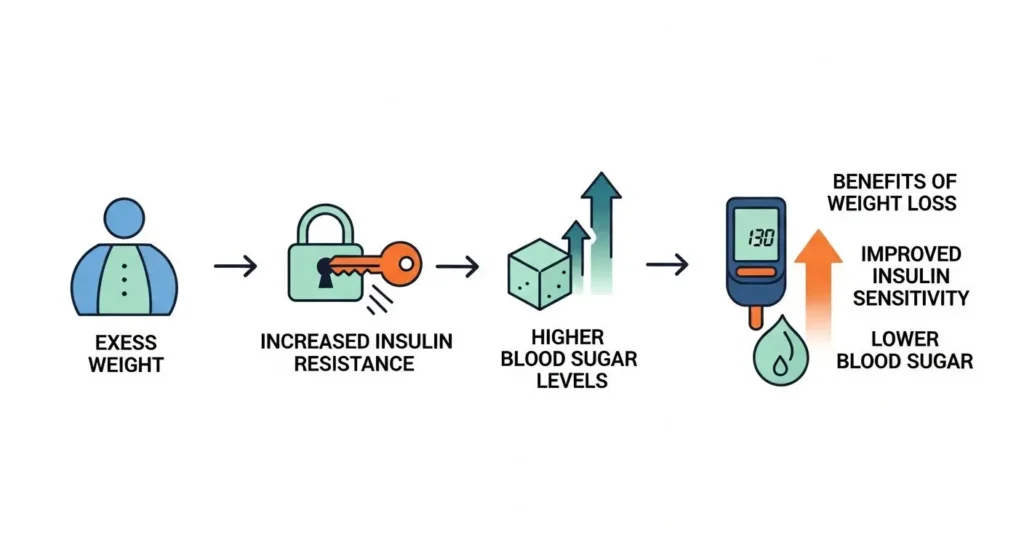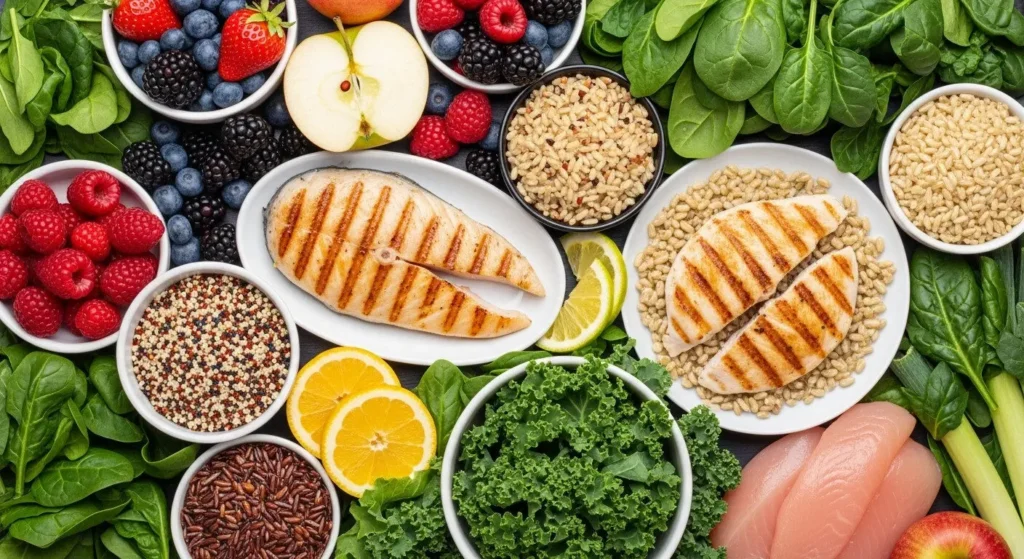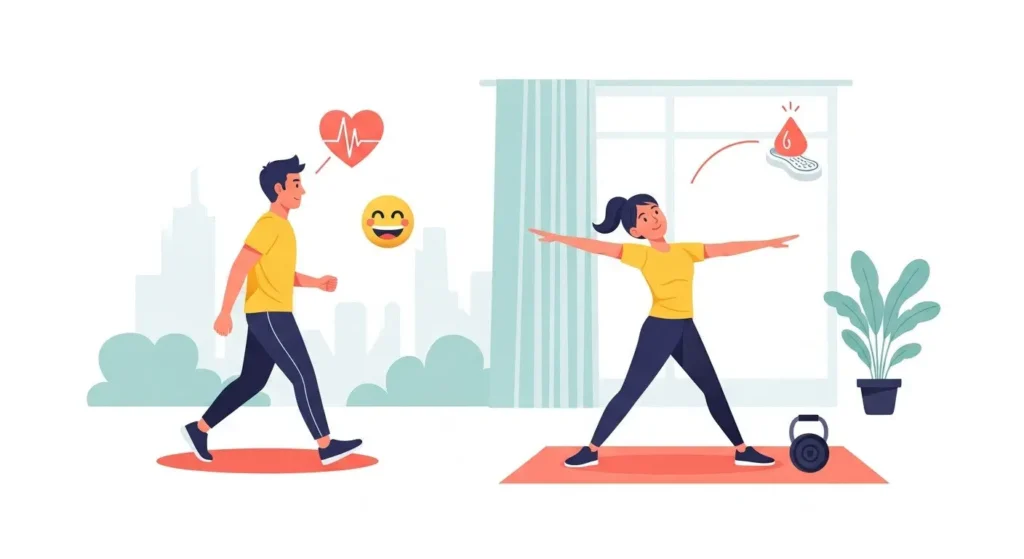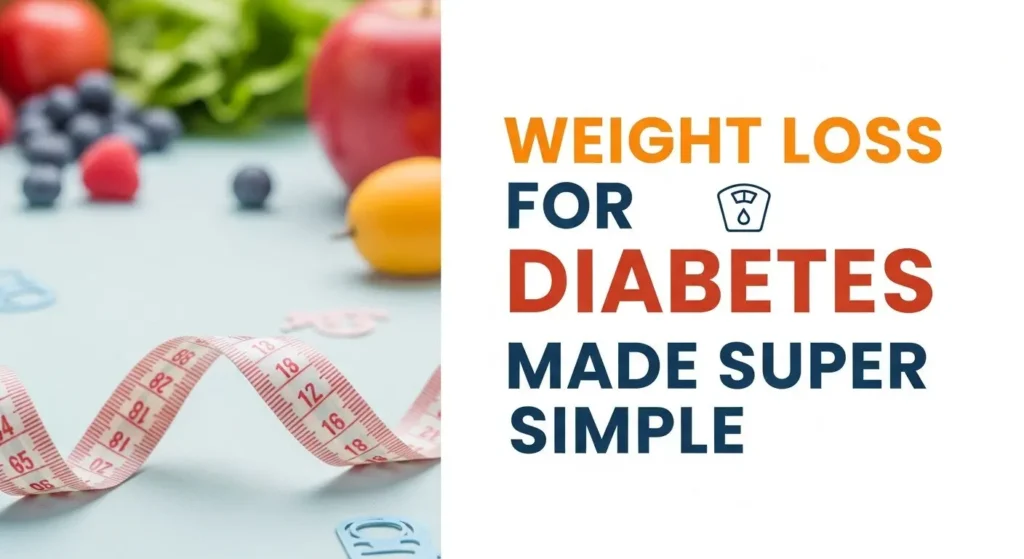Living with diabetes can feel like a constant balancing act, especially when it comes to managing your weight. You might hear a lot of confusing advice, making the goal of weight loss for diabetes seem impossible. But what if we told you it doesn't have to be complicated? What if small, simple changes could lead to big results for your health and help you manage your diabetes better?

This article is your friendly guide to making weight loss for diabetes super simple. We'll break down the most important steps into easy-to-follow advice, focusing on changes you can stick with for the long run. Get ready to feel more in control, healthier, and happier!

Key Takeaways
- Weight loss significantly improves diabetes management: Losing even a small amount of weight can lower blood sugar, improve insulin use, and reduce the risk of complications.
- Focus on simple, sustainable changes: Big changes can be overwhelming. Small, consistent steps in diet and activity lead to lasting success.
- Diet is key: Prioritize whole foods, lean proteins, and fiber. Learn simple food swaps to cut down on unhealthy carbs and sugars.
- Movement matters: Regular physical activity helps your body use insulin better and burns calories. Find activities you enjoy!
- Holistic health supports weight loss: Don't forget the power of good sleep, managing stress, and staying hydrated – they all play a big role.
Swap Your Way to Healthier Eating! 🍏
Choose a common food item below to see a healthier, diabetes-friendly swap that can help with weight loss.
Why Weight Loss for Diabetes Matter So Much
You might already know that losing weight is often recommended when you have diabetes, especially Type 2. But why is it such a big deal?
Think of it this way: when you carry extra weight, especially around your belly, your body's cells can become “stubborn” about using insulin. This stubbornness is called insulin resistance. Insulin is like a key that unlocks your cells to let sugar (glucose) in for energy. If your cells are resistant, that key doesn't work as well, and sugar builds up in your blood. This is why blood sugar levels go up in diabetes.
Losing weight helps your body become more sensitive to insulin. It's like making that key work smoothly again! This means your cells can take in sugar more easily, leading to:
- Lower blood sugar levels: Directly helps manage your diabetes.
- Less need for medication: Sometimes, people can reduce or even stop their diabetes medications under a doctor's supervision.
- Reduced risk of complications: Losing weight can lower your chances of heart disease, stroke, kidney disease, nerve damage, and vision problems, which are common with diabetes.
- More energy and better mood: Feeling lighter and healthier can boost your overall well-being.
“Even a modest weight loss of 5-10% of your body weight can make a significant difference in blood sugar control and overall health for people with diabetes.”

The “Simple” Approach: Small Changes, Big Results
Forget crash diets or extreme workout plans. These are often hard to stick with and can even be dangerous for people with diabetes. The “simple” way to lose weight involves making small, manageable changes that add up over time. Think of it as building healthy habits, one step at a time.
This approach is about:
- Consistency, not perfection: You don't have to be perfect every day. Just aim to be consistent most of the time.
- Sustainable habits: Choose changes you can realistically keep up with for months and years, not just weeks.
- Listening to your body: Pay attention to how different foods and activities make you feel.
- Patience: Weight loss for diabetes is a journey, not a race. Celebrate every small victory!
Diet: Your Plate is Your Power
What you eat is probably the most important part of your weight loss for diabetes journey when you have diabetes. But “diet” doesn't mean deprivation. It means making smarter choices!
1. Focus on Whole Foods
Think of foods that look like they came straight from nature. These are usually packed with nutrients and fiber, which are great for blood sugar control and keeping you full.
Eat More Of:
- Vegetables: Especially non-starchy ones like leafy greens, broccoli, carrots, bell peppers. Fill half your plate with these!
- Lean Proteins: Chicken breast (skinless), fish, eggs, beans, lentils, tofu. Protein helps you feel full and builds muscle.
- Whole Grains: Brown rice, quinoa, whole wheat bread, oats. These have more fiber than white grains, which helps slow down sugar absorption.
- Healthy Fats: Avocados, nuts, seeds, olive oil. In moderation, these are good for your heart and can help with fullness.
- Fruits: Berries, apples, oranges. Eat whole fruits, as they contain fiber. Limit fruit juice, which is often just sugar water without the beneficial fiber.

Eat Less Of (or Avoid):
- Sugary Drinks: Soda, sweetened tea, fruit juice, energy drinks. These are huge sources of empty calories and can spike blood sugar.
- Refined Carbs: White bread, white pasta, pastries, sugary cereals. These are quickly broken down into sugar.
- Processed Foods: Packaged snacks, fast food, frozen dinners high in sodium and unhealthy fats.
- Fried Foods: High in unhealthy fats and calories.
2. Master Portion Control
Even healthy foods can lead to weight gain if you eat too much. Learning portion sizes is key.
Simple Tips:
- Use smaller plates.
- Measure your food: Especially for high-calorie items like nuts, oils, and grains.
- Handy guide:
- Protein: Size of your palm
- Grains/Starchy Veggies: Size of your cupped hand
- Fats (e.g., nuts): Size of your thumb
- Eat slowly: Give your body time to realize it's full.
3. Smart Food Swaps
Making small swaps can make a big difference. Think of what you usually eat and how you can make it healthier.
| Instead of… | Try This Healthy Swap… | Why it Helps |
|---|---|---|
| White Rice/Pasta | Brown Rice, Quinoa, Whole Wheat Pasta, Cauliflower Rice | More fiber, slower blood sugar rise, keeps you full longer. |
| Sugary Soda | Water, Unsweetened Tea, Sparkling Water with Lemon | No empty calories, no blood sugar spikes. Hydrates better. |
| Fried Chicken | Baked or Grilled Chicken Breast | Much lower in unhealthy fats and calories. |
| Potato Chips | Air-popped Popcorn, Baked Kale Chips, Almonds | Healthier fats, more fiber, fewer processed ingredients. |
| Store-bought Fruit Juice | Whole Fruit (e.g., an Apple) | Whole fruit has fiber, which slows sugar absorption. |
| Sugary Cereal | Oatmeal (unsweetened), Greek Yogurt with Berries | More protein and fiber, keeps you full, avoids sugar crash. |
| Mayonnaise | Mustard, Hummus, Avocado Spread | Lower in fat and calories, adds flavor without the guilt. |
You can use the interactive “Food Swap Helper” above to find more ideas!
4. Meal Timing and Regularity
Try to eat at regular times each day. Skipping meals can lead to overeating later and can make blood sugar harder to manage. Aim for 3 balanced meals and perhaps 1-2 small, healthy snacks if needed.
For those interested in different weight loss for diabetes strategies, some people explore options like a 3-day fast for weight loss. However, if you have diabetes, it is absolutely critical to discuss any fasting plans with your doctor first, as it can significantly impact your blood sugar and medication needs. Safety is paramount.
Also, some individuals explore supplements to support their weight loss for diabetes journey. For example, there are Liv Pure reviews available for those curious about how certain products might fit into their plan. Always research and consult your healthcare provider before adding any supplements.
Exercise: Move Your Body, Lower Your Sugar 🏃♀️
You don't need to become an Olympic athlete to benefit from exercise. Even moderate activity can make a huge difference for weight loss for diabetes and overall health.
Why Exercise Helps:
- Burns Calories: Helps create the calorie deficit needed for weight loss.
- Improves Insulin Sensitivity: Your muscles use sugar more efficiently, even without much insulin.
- Lowers Blood Sugar: Directly helps bring down high sugar levels.
- Boosts Mood & Energy: Releases feel-good hormones.
- Builds Muscle: More muscle means your body burns more calories even at rest.

Simple Ways to Get Moving:
- Start Small: Begin with 10-15 minutes of walking daily and gradually increase. Aim for at least 30 minutes of moderate activity most days of the week.
- Walk More: Take the stairs, park further away, walk during phone calls. 🚶♀️
- Find What You Enjoy: If you hate the gym, don't go! Try dancing, swimming, cycling, gardening, or hiking. The best exercise is the one you'll actually do.
- Mix It Up:
- Aerobic (Cardio): Walking, jogging, swimming, dancing. Aims to get your heart rate up.
- Strength Training: Using weights, resistance bands, or your own body weight (push-ups, squats). Do this 2-3 times a week.
- Listen to Your Body: If something hurts, stop. Don't push too hard, especially when starting.
- Check Blood Sugar:If you have diabetes, check your blood sugar before and after exercise, especially when starting a new routine. Incorporating regular activity can support weight loss for diabetes, and it’s important to discuss with your doctor how exercise might affect your medication.
Hydration: Drink Your Way to Health
Water is often overlooked, but it's a powerful tool for weight loss for diabetes and overall blood sugar management.
- No Calories: Water fills you up without adding a single calorie.
- Curbs Cravings: Sometimes, thirst is mistaken for hunger. Drink a glass of water first.
- Metabolism Boost: Your body needs water to burn fat efficiently.
- Flushes Toxins: Helps your kidneys work better, which is extra important for people with diabetes.
Simple Tips:
- Carry a water bottle with you.
- Drink a glass of water before each meal.
- Add lemon, cucumber, or berries to flavor your water naturally.
- Avoid sugary drinks at all costs!
Sleep: The Unsung Hero of Weight Loss
It might sound strange, but getting enough quality sleep is crucial for weight loss, especially when you have diabetes.
How Sleep Affects Weight Loss for Diabetes:
- Hormone Balance: Lack of sleep messes with hunger hormones. Ghrelin (makes you hungry) goes up, and leptin (makes you feel full) goes down. This means you feel hungrier and less satisfied.
- Insulin Sensitivity: Poor sleep can increase insulin resistance, making it harder to control blood sugar.
- Cravings: When tired, you're more likely to crave sugary, high-carb foods for quick energy.
- Energy for Exercise: You'll have less energy to be active if you're constantly tired.

Simple Tips for Better Sleep:
- Aim for 7-9 hours of sleep per night.
- Go to bed and wake up at the same time each day, even on weekends.
- Create a relaxing bedtime routine (warm bath, reading, gentle stretching).
- Make your bedroom dark, quiet, and cool.
- Avoid screens (phones, tablets, TV) at least an hour before bed.
- Limit caffeine and heavy meals close to bedtime.
Stress Management: Don't Let Stress Weigh You Down
Stress can be a hidden enemy when you're aiming for weight loss for diabetes. When you're stressed, your body releases hormones like cortisol, which can make you store fat, especially around your belly, and also raise blood sugar levels.
How Stress Impacts Weight & Diabetes:
- Emotional Eating: Many people turn to food for comfort when stressed, often choosing unhealthy options.
- Hormonal Effects: Cortisol promotes fat storage and can raise blood sugar.
- Less Energy for Healthy Habits: Stress can leave you feeling drained, making it harder to stick to your diet and exercise plan.
Simple Ways to Manage Stress:
- Deep Breathing: Just a few minutes of deep, slow breaths can calm your nervous system.
- Mindfulness/Meditation: Apps or guided meditations can help you focus and relax.
- Hobbies: Engage in activities you enjoy – reading, painting, listening to music.
- Spend Time in Nature: A walk in a park or just sitting outdoors can be very calming.
- Connect with Others: Talk to friends, family, or a support group.
- Set Boundaries: Learn to say “no” to things that add too much pressure.
Remember, taking care of your mental well-being is just as important as diet and exercise for your overall health. For men, maintaining overall health also involves paying attention to specific health areas, such as prostate health. While not directly related to weight loss, understanding options like prostate supplements or reviewing the most effective prostate supplements or even specific products like Prostavive can be part of a holistic approach to well-being.
Monitoring and Support: Track Your Progress, Stay on Track
You don't have to do this alone! Monitoring your progress and getting support are vital parts of making weight loss simple and sustainable.
- Track Your Food: Use a simple food diary or an app to log what you eat. This helps you see patterns and identify areas for improvement.
- Monitor Your Blood Sugar: Regularly checking your blood sugar helps you understand how different foods and activities affect you. Share these readings with your doctor.
- Weigh Yourself Regularly: Once a week or every few days is usually enough. Don't obsess over daily fluctuations.
- Work with Your Healthcare Team: Your doctor, a registered dietitian, or a certified diabetes educator can provide personalized advice and support. They can help adjust medications as you lose weight.
- Find a Support System: This could be a friend, family member, or a diabetes support group. Sharing your journey can make it easier and more motivating.
Special Considerations & Safety First!
While this guide aims to make weight loss simple, it's crucial to remember that diabetes management is serious.
- Always Consult Your Doctor: Before making any significant changes to your diet, exercise routine, or considering supplements, talk to your doctor or a diabetes specialist. They can ensure your plan is safe and effective for your specific condition and adjust your medications as needed.
- Beware of Hypoglycemia: If you take insulin or certain diabetes medications, weight loss and increased activity can lower your blood sugar too much (hypoglycemia). Learn the signs and how to treat it.
- Stay Hydrated: This is especially important if you increase your physical activity.
Conclusion: Your Journey to a Simpler, Healthier You!
Weight loss for diabetes doesn't have to be a daunting task. By focusing on simple, consistent changes in your diet, increasing your physical activity, prioritizing sleep, managing stress, and staying hydrated, you can achieve significant results. Remember, every small step forward is a victory!
This journey is about building healthy habits that not only help you lose weight but also empower you to manage your diabetes more effectively, feel more energetic, and enjoy a better quality of life. Be patient with yourself, celebrate your progress, and know that a healthier, simpler path is within your reach.









